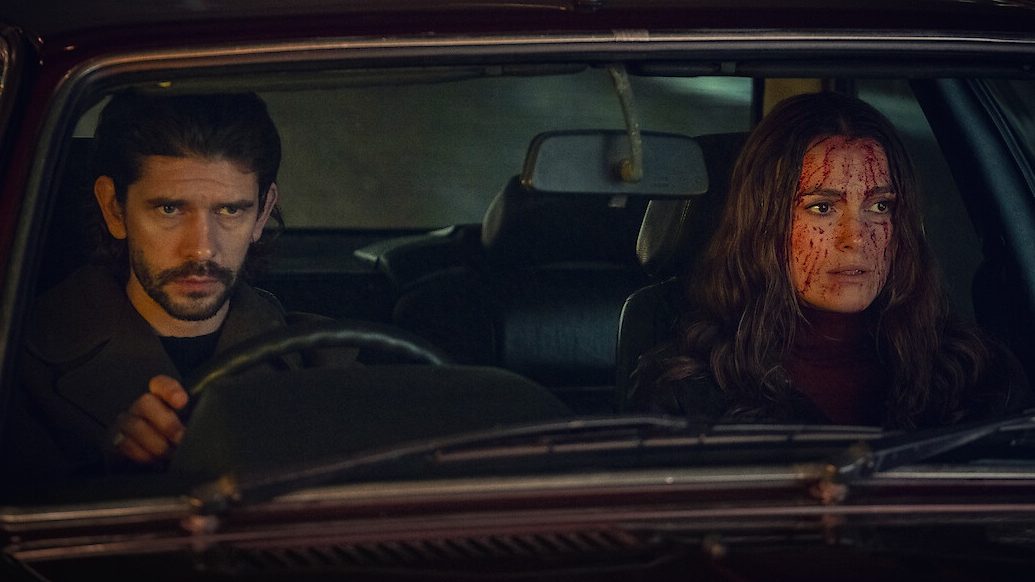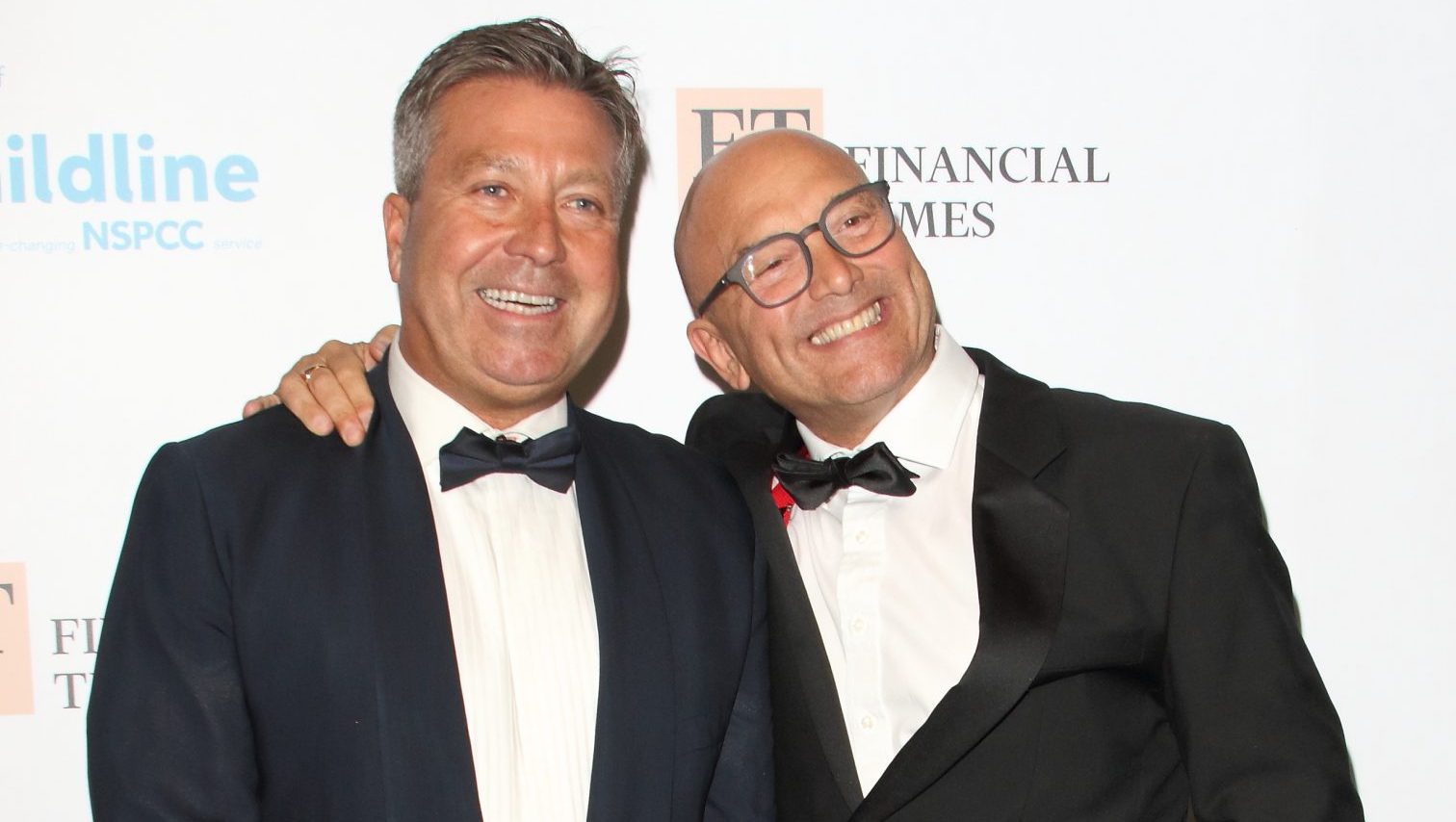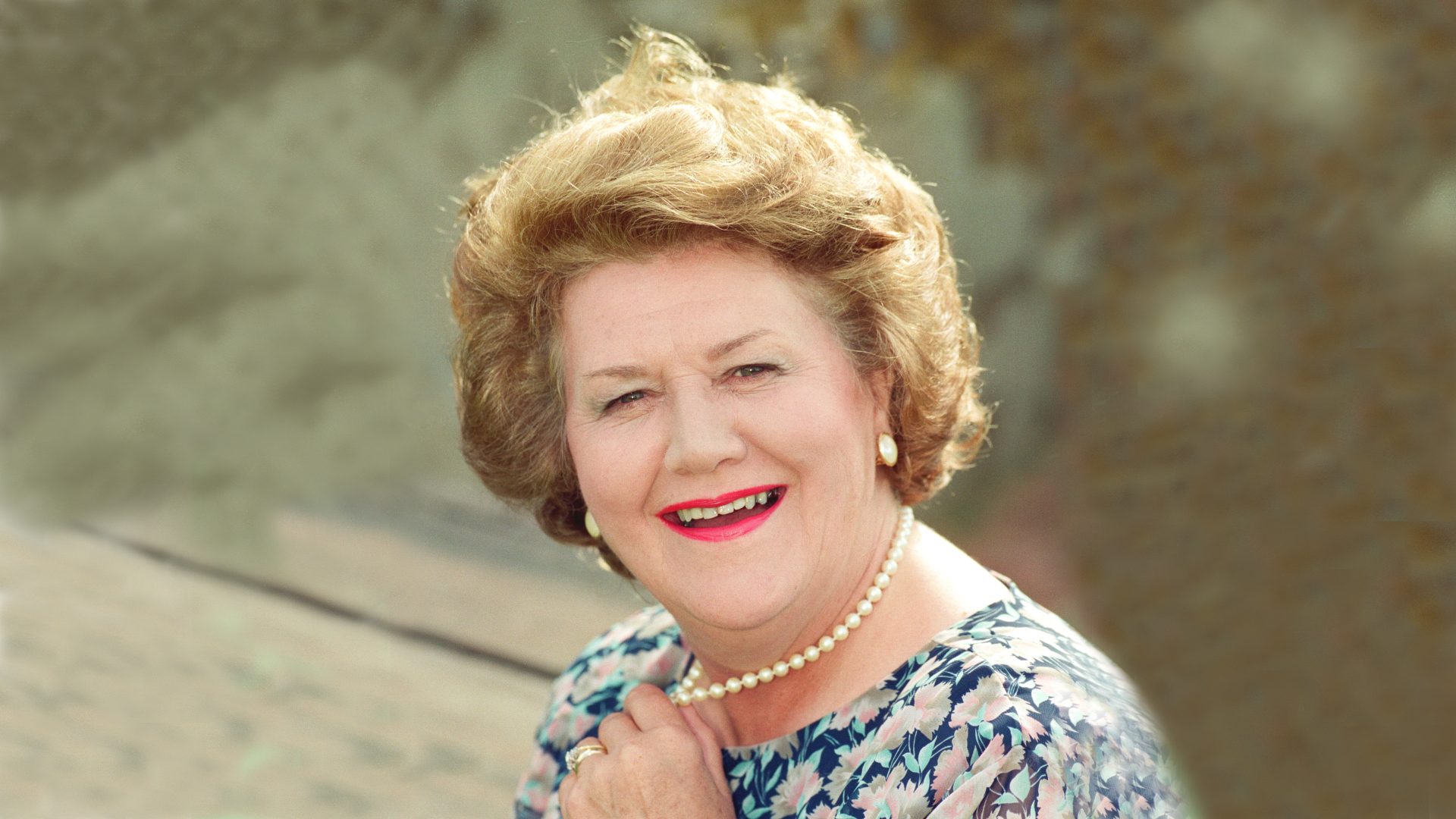Black Doves (Netflix)
From the first overhead shot of festive cheer inside the Coal Hole pub in the Strand, via twinkling lights in London shops, to busy family preparations for Christmas, Black Doves riffs wittily on memories of Keira Knightley in Love Actually (2003). Has her character from the classic Richard Curtis rom-com got divorced, remarried a high-flying politician – defence secretary, tipped for the top job – and had twins with him?
Well, no. When she is not smoothing the political path of her husband Wallace (Andrew Buchan) or getting their elegant home ready for the festive season, Helen Webb (Knightley) is a deadly secret agent, expert in covert ops, martial arts and the use of firearms, working for a secret organisation that calls itself the ‘Black Doves’. “We’re procurists, harvesters,” says her boss, Reed (Sarah Lancashire). “We deal in the currency of information”.
As the wife of a prospective PM, Helen has easy access to some pretty lucrative intelligence. But – to Reed’s dismay – she has also fallen in love with a civil servant, Jason Davies (Andrew Koji), who is assassinated early in the first episode.
Meanwhile, Wallace is embroiled in a diplomatic row, following the death of the Chinese ambassador and kidnap of his heroin-addicted daughter Kai-Ming (Isabella Wei). The Chinese do not buy the official line that their man died of an overdose and are threatening military retaliation: a “catastrophic escalation of violence”, to be precise.
Enter Sam Young (Ben Whishaw), Helen’s partner and best friend, who has been abroad for seven years. As a “trigger man” – an expert in murder and the darker arts of espionage – he is best-placed to clear up the mess, and he and Helen embark upon a quest to find out what the hell and why. Sam is also preoccupied by the possibility of reconciliation with his beloved ex-boyfriend Michael (Omari Douglas).
Created by Joe Barton, Black Doves is riotously entertaining, cartoonishly violent and often very funny. At its heart is the chemistry between Helen and Sam, whose relationship is pure screwball (“It was a bit of a clusterfuck.” “Was it? “Little bit”), punctuated by punch-ups, car chases and shootouts.
Barton has a Dickensian love of London and its underworld, revelling in the lines delivered by his supporting characters as much as the main narrative. En route to another certain-death destination, hitwoman Eleanor (Gabrielle Creevy) yells: “You’re doing my head in! Literally – a car full of assassins, trying to find the moral high ground!”
All six episodes are online, and a second season has already been commissioned. Festive fun at its most lethal.
The Importance of Being Earnest (National Theatre, London, until January 25)
“We live, I regret to say, in an age of surfaces” says Lady Bracknell, superbly rendered in Max Webster’s production by Sharon D Clarke as an Afro-Caribbean matriarch. Her delivery of the classic line “A handbag?” at last gives Edith Evans a run for her money.
In this case, the surfaces are bright to the point of psychedelia, the costumes joyously androgynous and cross-cultural, the style a blend of farce and pantomime. The curtain rises to reveal Algernon (Ncuti Gatwa, aka the 15th Doctor) in a pink ballgown, playing Grieg’s Piano Concerto, setting the tone for the glorious romp that follows.
Oscar Wilde’s final play, which opened in 1895 shortly before his trial, is a shimmering essay on double identities, code-switching and playful deceit. Algernon explains to his friend Jack (Hugh Skinner) that they are both “Bunburyists”: Bunbury being the fictional invalid to whose needs Algernon attends when he wants to make himself scarce. In similar spirit, Jack pretends that he has a wayward brother called Ernest – his alter ego when he is in town.
The metaphor for the dual existence forced upon gay people in repressive times still has force. But this version of the play scarcely disguises the homoerotic nature of the relationship between Algernon and Jack; or the sexual attraction between Cecily (Eliza Scanlen) and Gwendolen (Ronkę Adékoluéjó), whom, respectively, the two bachelors are supposed to be pursuing.
Webster adds in a few contemporary touches: James Blunt’s You’re Beautiful, chords from Girls Just Want to Have Fun, and a perfectly timed “Oh, for fuck’s sake”. In less capable hands, all the bawdiness and broad comedy might have undermined the timeless subtlety of Wilde’s language. But the performances are uniformly excellent.
In Gatwa’s case, the only question is how big a star he is going to be. Pretty damn big, I’d say.
Rumours (Selected cinemas)
The formal opening tableau of Rumours – which, for convoluted reasons, takes its name from the 1977 Fleetwood Mac album – suggests the inspiration of Wes Anderson. But, as we encounter the leaders of the G7, meeting in the forest-bound town of Dankerode in Saxony, it becomes rapidly clear that the co-directors, cult Canadian film-maker Guy Maddin and brothers Evan and Galen Johnson, are channelling the surrealism of Luis Buñuel and the absurdism of Eugène Ionesco.
Cate Blanchett is terrific as host and German chancellor, Hilda Ortmann, who informs her international counterparts, gathered under a gazebo for dinner, that the theme of the summit will be “regret”. Tatsuro Iwesaki (Takehiro Hira), the Japanese premier, says he is sorry he never learned to ride a horse. French president Sylvain Broulez (Denis Ménochet) wishes he had been more respectful to his father. Italian PM Antonio Lamorte (Rolando Ravello) blurts out that he went to a fancy-dress party as Mussolini.
What follows is hilarious, clever – and utterly deranged. The US president Edison Wolcott (Charles Dance) keeps nodding off and, when he is awake, speaks with an English accent. British PM Cardosa Dewindt (Nikki Amuka-Bird) is ill at ease around Canadian premier Maxime Laplace (Roy Dupuis), with whom she had an affair.
In the woods, meanwhile, arise Iron Age zombies, a brain the size of a car (totally unexplained) and a chatbot programmed to ensnare paedophiles. Though the theme of environmental crisis looms over Rumours, it is emphatically not a conventional political satire.
Its barbs are sharper, precisely because of the soaring ludicrousness of everything that the politicians do and see in the woods. Its flavours are strong and its humour pitiless – and, in consequence, the movie is all the more effective, original and innovative.
Didion & Babitz by Lili Anolik(Atlantic Books)
Joan Didion and Eve Babitz were both luminaries of 1960s and 1970s counter-culture in California, writers who chronicled that era with vivid energy. They died within days of one another, in 2021. Didion is venerated to this day. Babitz drifts in and out of obscurity.
That she is remembered at all today owes much to Lili Anolik’s 2019 biography Hollywood’s Eve: Eve Babitz and the Secret History of LA and, five years on, the author returns to her subject: this time in a riveting dual biography that charts the relationship between the two women and their dramatically different approaches to life.
In 1971, Didion helped Babitz get a story published in Rolling Stone magazine, championed her first book and started to edit it (Babitz claimed to have “fired” her patron). Anolik makes excellent use of a new cache of letters to plot the decline and fall of their sisterhood – though it is not always clear which were actually sent.
The book’s central thesis is that Didion and Babitz personified “two halves of American womanhood, representing forces that are, on the surface, in conflict yet secretly aligned — the superego and the id, Thanatos and Eros, yang and yin”.
Didion was tiny, steely, focused and conventionally married for nearly 40 years to John Gregory Dunne. Babitz – whom Dunne condescendingly called the “dowager groupie” – was voluptuous, libidinous and sensual; the godchild of Stravinsky who, aged 20, was photographed naked playing chess with Marcel Duchamp. Her lovers included Jim Morrison, Harrison Ford and Annie Leibovitz.
She evidently considered herself to be Didion’s peer and rival: the Rolling Stones to her Beatles. In practice, however, Babitz was more like Salieri to her erstwhile friend’s Mozart; left behind and resentful. This makes the book more rather than less interesting. What separates the almost-legendary from the real thing?
Anolik is commendably honest about her sympathies: “I won’t even try to pretend to be a disinterested party here. I’ve picked my side: Eve’s.” As a long-time Didion devotee, I bristled occasionally at the book’s gossipy assertions. But it is good to puncture reverence and to be sceptical about hagiography; and Anolik is a fearless bulldozer of both.
The Madness (Netflix)
Colman Domingo, who was Oscar-nominated this year for his performance in Rustin and should receive the nod once more on January 17 for Sing Sing, is outstanding as ever in this eight-part thriller. Muncie Daniels, a CNN contributor on the verge of greater stardom, escapes from Philadelphia to the Poconos to work on a book.
His temporary neighbour (Tahmoh Penikett) recognises him and amiably offers help if he needs anything. When Muncie’s electricity cuts out and he walks over to the next-door property, he finds the same man chopped up on the polythene-sheeted floor of his sauna. The assassins spot him and chase him into the woods.
Though Muncie makes it out alive, he is soon being framed for murder by cops aware of his “BLM ties” – and the dead man, Mark Simon, turns out to have been a leading member of the white supremacist group, The Forge. Though he finds an ally in FBI agent Franco Quinones (John Ortiz), Muncie grasps that his family – his estranged wife Elena (Marsha Stephanie Blake), son Demetrius (Thaddeus J. Mixson) and daughter Kallie (Gabrielle Graham) – are all in grave peril, too. As his options narrow, he seeks help from his friend and mentor Isiah (Stephen McKinley Henderson), who runs his operation from a cigar store.
Created by Stephen Belber, The Madness dives fast and deep into the world of anarchists, neo-Nazis, tech billionaires with a political agenda, and the hidden recesses of global power. Bradley Whitford delivers as always, playing one of the sinister oligarchs.
But it is Domingo’s towering screen presence that holds the drama together, and the subtlety of his acting that keeps you asking: what really is the madness?




